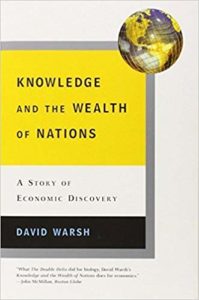
I’m reading and enjoying David Warsh’s Knowledge and the Wealth of Nations. I hadn’t read it when it came out, but I need to now to write the Paul Romer bio for The Concise Encyclopedia of Economics. Warsh, who was a long-time economics columnist for the Boston Globe, is an excellent writer. Not many people can write a 300+ page book about economic thinking that is a suspenseful page turner. Normally I hate suspense in non-fiction writing; I want the author to tell me the damn point in the first few pages. But Warsh has succeeded in keeping me reading.
By the way, he did a nice review of The Fortune Encyclopedia of Economics in the Boston Globe when the book came out in 1993.
So with that preface, guess what: I’m going to do what I sometimes do, which is be critical. On page 44, Warsh quotes the following famous passage from Adam Smith’s The Wealth of Nations:
People of the same trade seldom meet together, even for merriment and diversion, but the conversation ends in a conspiracy against the public, or in some contrivance to raise prices.
Warsh then writes immediately following:
Collusion for a time can make it so. In these circumstances, government has certain responsibilities to act.
Walsh seems pretty clearly to be expressing his views, but readers who don’t know Smith well may think that he is telling us Smith’s views.
Question: Is Warsh telling us Smith’s views? If so, why? If not, why not?


READER COMMENTS
Jon Murphy
Dec 4 2018 at 12:19pm
He’s definitely not telling us Smith’s view. The following sentences are:
Smith goes on in the next few paragraphs talking about various regulations and legislation that require such meetings necessary. Indeed, throughout the Wealth of Nations (not to mention his Lectures on Jurisprudence), Smith emphasizes a neutral government to the extent possible (see his discussion on religion, I think in Book V). Even in cases where Smith makes an exception in his “liberal system,” he is suspicious of the government’s ability to prudently act (see, for example, his discussion on why he is doubtful that government can indeed use tariffs to open other markets or address other potential exceptions he discussed in Book IV).
Smith does argue from time to time that certain regulations might be necessary to enhance overall liberty (the phrase used by my professor Dan Klein and not by Adam Smith) at the expense of individual liberty, but these exceptions are few, far between, and do not involve breaking up of trusts by government force.
David Henderson
Dec 5 2018 at 12:57pm
Bingo, Jon Murphy. And isn’t it interesting in another way that people leave that part of the quote off: by regulating an industry, the government does facilitate such assemblies. Firms form trade associations to fight off, or to design, government regulations.
Comments are closed.